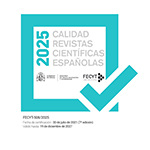The effect of the American stereotypes in the formation of the middle class Greek family image in the post-war print advertisements
Resumen
This research aims to capture the value of the first, mass-produced, women’s magazines advertising in post-war Greece regarding the identification, the analysis and the morphology of both the middle class Greek family image and ideal.
With the help of rich and unexplored material of that era found in photo albums, folklore or museums, and by looking at the political, economic and social history of the country, we will initially attempt to capture the real characteristics of the urban Greek family, in the way they were reshaped after the end of the destructive World War II.
We will then explore the grounds on which the print advertising in the country seemed to be drastically affected by the US advertising standards that dominated the global landscape of post-war trade. Through this practice we will discover that the post-war Greek family started to be presented through the American stereotype in which it was not involved at all in reality. The presentation of mother / wife / homemaker, the role of father / husband as well as the sophisticated image of children seemed not merely to abstain from the daily routine of the average Greek family image, but to oppose to it, both aesthetically and practically.
But how did the - mostly - female readership take the fabulous display of the ‘new Greek family’ which was based on the American standards and what was the final effects of this type of advertising on the post-war average Greek family consumption behaviour? Did it work effectively or it simply constituted a comical and silly manner which endangered the new products consumption? All these questions will be answered with the help of much photographic/advertising material found in many rear women’s magazines of the era, and some valuable, though small in volume, literature.
Descargas
Descarga artículo
Licencia
La revista Arte, Individuo y Sociedad, para fomentar el intercambio global del conocimiento, facilita el acceso sin restricciones a sus contenidos desde el momento de su publicación en la presente edición electrónica, y por eso es una revista de acceso abierto. Los originales publicados en esta revista son propiedad de la Universidad Complutense de Madrid y es obligatorio citar su procedencia en cualquier reproducción total o parcial. Todos los contenidos se distribuyen bajo una licencia de uso y distribución Creative Commons Reconocimiento 4.0 (CC BY 4.0). Esta circunstancia ha de hacerse constar expresamente de esta forma cuando sea necesario. Puede consultar la versión informativa y el texto legal de la licencia.










